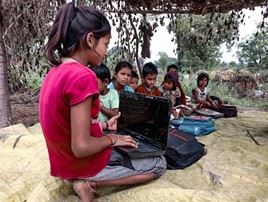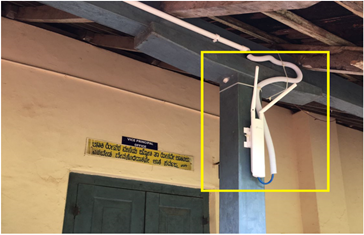

25th April 2022

We often remember the days, when the internet was not easily available at school or at home and the resultant struggle we would go through to work on assigned projects or to learn about something new. It is hard to imagine a life without a fast-paced internet connection today. The significance of active internet connection is felt even more, the moment there is a power cut at home and the back-up diesel generators of our societies take a minute or two to kick-in. The horror of being disconnected from an online meeting or our kids dropping out of their classes and missing a few crucial minutes of their lesson, has pushed us to take a step further and buy special purpose UPS (Uninterrupted Power Supply) for our internet routers. The Internet has become the undisputed source of reliable instant information. Most of urban India, in contemporary times, is dependent on the internet, right from booking cabs to ordering groceries. Education system has been completely reformed by the internet, with several online-class delivery platforms and coding applications now available for students and working professionals to hone their skills. The Internet has now become a necessity and without it we find it difficult to function.
In the same day and age, a primary school teacher in Mullur, a remote village in Karnataka, had to build a treehouse classroom, in search for better wireless internet connection. According to a report prepared by the Ministry of Education, only 22% of the schools in India had internet connection in the year 2019-2020. The figure drops to 11.58% for government run schools across the country. Since it is an approximate figure, one can only imagine the poor connectivity in some of the schools in the remote villages of our country. Mobile internet connection which seemed like an answer for making fast reliable internet available for everyone has failed to bring in the desired effect.
The 4G penetration is growing at a rapid rate in India. In terms of availability of active 4G internet connectivity, India stands at the 10th place worldwide. Having said that, India's average 4G speed remains one of the lowest in the world. It ranks 129th in a list of 138 countries in terms of average 4G speed. The average 4G data speed in India is between 6.9 to 9.5 Mb per second which is extremely low for consuming video content, more so for large video content such as classes and tutorials. In terms of reliability and speed, broadband is probably the best fit for educational purposes at schools.
While we may still be far away from making a broadband connection available to every rural household, the government through its many programs such as National Broadband Mission and National Optical Fiber Network, is improving the availability of broadband internet in India. However, the rural broadband penetration of 29.1% is much lower than the national average of 51.1%. The challenges remain in the last mile connectivity and bringing these connections to individual rural schools. Considering the one-time setup cost and the monthly recurring cost for usage, broadband internet continues to be rather expensive for most of the rural households.
The Internet is a great leveler when it comes to education. It democratizes the availability of information. The tutorial of a subject or topic which only kids living in urban areas with state-of-the-art coaching infrastructure and teachers had access to, now can be easily accessed on the internet, from the most remote areas of the country. Hence, it is imperative to ensure that something as basic as a fast and reliable internet connection is available for all school going kids in the rural parts of the country.
A fast and reliable wireless internet connection in a rural school has the potential of connecting many school-going children to the internet, thereby ensuring a proper accessibility of resources and opportunities. It would provide students access to several freely available education platforms and would also give them an exposure towards different career possibilities. A common internet connection at a rural school would also bring together kids from different households at a common place which would also enable sharing of knowledge and development of community. The graphical nature of content delivery would attract more students from across communities and would help bridge the educational gap between rural and urban students.
RTL's Broadband @ Rural Schools Program
Right To Live through its program of "Broadband @ Rural Schools" is making a difference by providing internet connections to the government schools in the remote areas which otherwise face an issue of network connectivity. With regard to this project, they have successfully covered 6 schools in Suilliaand Dakshina Karnataka and intend to cover more government-run schools in the rural and remote parts of the state. RTL, utilising the fund received, sets up a Wi-Fi network with a range of about 100 meters at the chosen rural schools by associating with ISPs like BSNL for bandwidth and purchasing the routers and other relevant hardware from OEMs. A broadband connection at rural schools would help the children in accessing various online classes. RTL in association with BYJU's (an educational technology company) runs a program that provides digital infrastructure for the classroom. The project includes a Smart TV and an Android box/tablet which delivers specially curated content of BYJU's educational platform to the children in the chosen government schools. A fast and reliable broadband would complement RTL's education program.

If you want to read more about the initiative and want to improve the educational opportunities for the kids in the rural parts of the country, by donating to the cause, you can do so by using the link provided below.
Let us come together and ensure that something as basic as the availability of the internet doesn't become a hindrance in the development of a child.